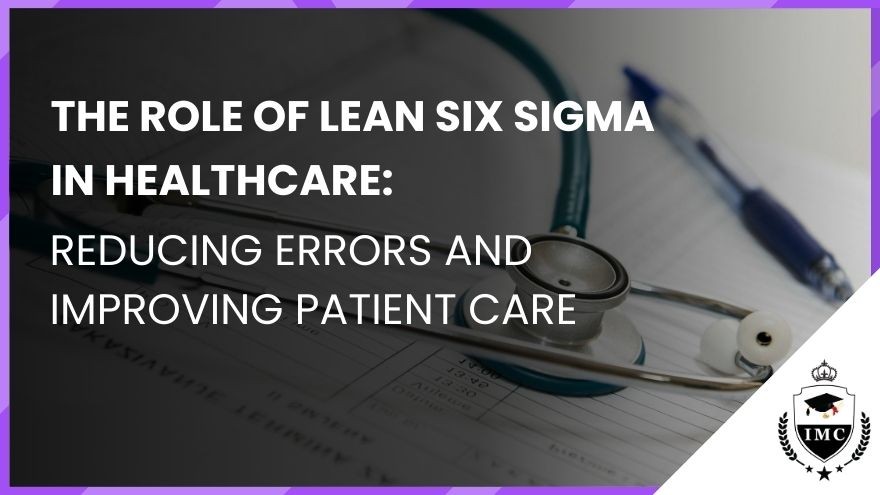In healthcare environment, delivering high-quality patient care while maintaining efficiency is critical. Medical errors, administrative bottlenecks, and resource waste not only affect the bottom line but also risk patient safety and satisfaction. Lean Six Sigma has emerged as a transformative tool in healthcare, providing a structured methodology to minimize errors, streamline operations, and ensure superior patient care.
What is Lean Six Sigma?
Lean Six Sigma combines two powerful methodologies: Lean, which focuses on eliminating waste, and Six Sigma, which reduces variability and errors through a data-driven approach. Together, they enable organizations to improve processes, enhance operational efficiency, and deliver better quality. Healthcare institutions adopting Lean Six Sigma have seen significant improvements in patient outcomes, reduced operational costs, and enhanced service quality.
How Lean Six Sigma Reduces Errors in Healthcare
Errors in healthcare can be life-threatening. Whether it's a misdiagnosis, medication error, or a delay in treatment, the stakes are incredibly high. Lean Six Sigma equips healthcare professionals with tools to identify inefficiencies, reduce errors, and continuously improve the delivery of care. Here’s how:
- Data-Driven Problem Solving
Lean Six Sigma emphasizes the use of data to understand the root causes of problems. This approach is crucial in healthcare, where decisions based on data can lead to improved patient safety and care. For instance, analysing patient wait times or tracking error rates in medication administration can help identify critical areas for improvement. - Standardized Procedures
Healthcare facilities often face variability in procedures, leading to inconsistent outcomes. Lean Six Sigma promotes standardization, ensuring that tasks such as patient intake, discharge, or surgical protocols are followed uniformly. This not only reduces the chance of errors but also improves overall efficiency. - Reducing Wastes in Processes
In healthcare, waste can appear in many forms: excessive wait times, underutilized staff, or redundant paperwork. Lean Six Sigma tools like Value Stream Mapping allow healthcare organizations to visualize their workflows and identify non-value-adding activities. By eliminating these wastes, processes become more efficient, ultimately benefiting both staff and patients. - Improving Communication and Collaboration
Poor communication between departments and healthcare providers is often a source of errors. Lean Six Sigma promotes collaboration and improved communication, ensuring that every member of the care team has access to the same information and understands their role in the patient’s care plan.
Enhancing Patient Care with Lean Six Sigma
In addition to reducing errors, Lean Six Sigma plays a crucial role in enhancing the overall patient care experience. Here are some ways it helps:
- Faster Patient Turnaround
By optimizing processes, Lean Six Sigma reduces delays in patient care, ensuring timely treatments, and preventing prolonged hospital stays. Efficient processes lead to a smoother patient flow, reducing the chances of complications due to waiting. - Enhanced Patient Satisfaction
Patients value efficient, error-free, and compassionate care. Lean Six Sigma’s focus on continuous improvement ensures that healthcare providers are always working towards enhancing patient experience by addressing areas like appointment scheduling, billing processes, and patient interactions. - Reduction in Hospital-Acquired Infections
By standardizing protocols and eliminating process inefficiencies, Lean Six Sigma helps reduce incidents of hospital-acquired infections. This, in turn, leads to better patient outcomes and reduced healthcare costs.
Real-World Examples of Lean Six Sigma in Healthcare
Many hospitals and healthcare facilities worldwide have successfully implemented Lean Six Sigma to improve patient care:
- The Mayo Clinic reduced patient waiting times by 50% by applying Lean Six Sigma tools to streamline its appointment scheduling process.
- Cleveland Clinic utilized Lean Six Sigma to improve communication across departments, leading to a significant reduction in medication errors.
These real-world examples demonstrate the tangible impact Lean Six Sigma can have in healthcare settings, making a compelling case for its wider adoption across the industry.
Earning Lean Six Sigma Certification from IMC Institute
If you're a healthcare professional looking to bring transformative change to your organization, earning a Lean Six Sigma certification is an invaluable asset. IMC Institute offers comprehensive Lean Six Sigma certification programs, including Yellow, Green, Black, and Master Black Belt levels, designed to equip you with the skills needed to lead process improvement initiatives in healthcare.
IMC Institute’s Combo Offer: Lean Six Sigma + PMP Certification
For professionals seeking an even broader skill set, IMC Institute also offers PMP (Project Management Professional) certification accredited by PMI. In today’s healthcare environment, combining Lean Six Sigma with project management skills can set you apart as a leader capable of managing complex healthcare projects with precision.
To make this even more accessible, IMC Institute offers a special combo offer: Enroll in both the Lean Six Sigma and PMP certification programs and receive 50% off the total cost. This discount provides a cost-effective way to enhance your expertise and make a lasting impact on your healthcare organization.
Why Lean Six Sigma Certification Matters
In an industry where even small errors can have significant consequences, Lean Six Sigma offers healthcare professionals a proven method to minimize risks and improve care. With the growing demand for operational excellence in healthcare, having Lean Six Sigma certification not only boosts your career prospects but also positions you as a key player in delivering high-quality, efficient care.
By choosing IMC Institute for your Lean Six Sigma certification, you’ll gain practical skills, recognized certifications, and the opportunity to drive meaningful change in healthcare.
Summary
Lean Six Sigma is revolutionizing the healthcare sector by reducing errors, streamlining operations, and enhancing patient care. As healthcare continues to evolve, the need for professionals who can lead these improvements has never been greater. IMC Institute offers the tools and certifications needed to make an impact—whether through Lean Six Sigma, PMP, or both. Don’t miss the opportunity to take advantage of the combo offer and set yourself up for success in the fast-evolving healthcare landscape.
Transform your healthcare career with IMC Institute’s Lean Six Sigma certification today!






